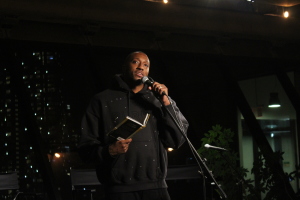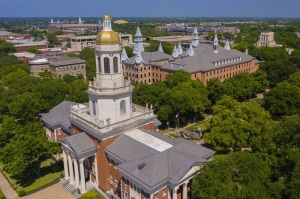Where Was God in the Flood of Nashville?
There is a small phrase in the Bible that has been bothering me – especially since the tragic flood that nearly swept Nashville away. This small phrase is found in Luke 8:25 where Jesus' cruise across the Sea of Galilee was interrupted by a windstorm that threatened to sink their entire mission enterprise. You know the story. The disciples set sail with Jesus across the Sea of Galilee, Jesus takes a nap, the storm foments the sea and threatens to sink their small boat, Jesus calms the storm, and the disciples are amazed. Then comes verse 25 – "He said to them, 'Where is your faith?' And they were afraid, and they marveled, saying to one another, 'Who then is this, that He commands even winds and water, and they obey Him?'" The small phrase – "He commands even winds and water, and they obeyed Him" – says much about the often comforting, sometimes disturbing, always present sovereignty of God. Let me explain.
When a tragedy takes place in our world most Christians do everything in their power to protect God's good name. We will blame disasters on everything BUT God. We say, "God could never do that; God would never do that." The unintended consequences of explaining away any role for God in the devastating disasters of life is that God is reduced to being a bench player until after the tragedy. That is, God becomes an "after-the-fact" kind of God who is able only to comfort the grieving but is never a God who may design tragedy for our good and His glory. This kind of language about God for most of us is shocking!
Further, this kind of erroneous theology makes God out to be a reactionary God only. God can comfort in the tragedy, but He can never cause the tragedy. Rather than God being a part of the event, the tragic event is designed and caused by some misnamed power like Mother Nature or by saying the Accident god caused it or by saying that it's Satan's fault. If we make God out to be only a reactionary God we have unwittingly made Him less of a God than what caused the event itself. In essence, we have committed the sin of idolatry in creating a god to explain the tragedy rather than attempting to understand the mystery of the God's sovereignty. We may not knowingly admit this claim, but it is the consequence of saying that God only shows up after the fact and not prior to the fact. God becomes the helpless God of heaven who must wait for a tragedy to pass before He can intervene.
Let's look at Luke 8:22-25 in a different way. Let's suppose that Jesus – the One who created and controls all things; the One who has all things at His disposable (John 1:3) – desired to design a circumstance to grow the faith of His followers and to demonstrate His sovereign power (and there may be more purposes that I cannot see). It would then follow that He designed the time they would launch their boat, He designed the timing and place of the storm, He designed raising the anxiety level of His disciples by falling asleep prior to the storm, and He designed the calming of the storm and the questioning of their faith. This kind of perspective makes sense of that phrase "He commands even winds and water, and they obey Him." I take this to mean that Jesus was not caught off guard by the storm. Rather, He commanded what He created. He made the wind and the water and they did His bidding. Like the old saying goes, "Has it ever occurred to us that nothing has ever occurred to God?" I do not know how God directs what He has created, but I do know that Scripture teaches that God is sovereign even when I can't get my finite mind around His infinite purposes.
Most of us are not ready for this kind of sovereignty. Neither am I. It makes us uncomfortable to speak of God in this way. It comes close to making God culpable for evil. But we cannot speak out of both sides of our mouth when it comes to God's power. We cannot both claim that God has the power to do all things and then not be able to do all things. I have no other conclusion than to say that God is sovereign over all things and in all things. This is not to say that God does evil. It is to say that all things – both good and bad – are under His control. It is to say that God either causes a thing or permits a thing. It is to say that whether God permits a thing or causes a thing He always designs a thing for purposes that are sometimes beyond our grasp. It is to say that there is no God but God.
Whether an event is intentionally caused by God as the first cause or permitted by God as the secondary cause, it is nevertheless the design of God in all things whether good or bad to bring us to Himself and to seek His own glory. The supreme biblical example is found in the Book of Job where it is God himself who teases Satan into considering and then testing the faith of Job (Job 1:8). Job loses everything, except his wife (and she was no help). Satan is the immediate cause of the evils that come Job's way; God is the ultimate cause of Job's distress.
The reason this issue is important is because it forces us to live with a different set of questions – the right questions. To say that God does not, will not, and cannot do or permit all things both good and bad does not help, leaving us with many unresolved questions about God's abilities. In fact, for me, it leaves me with more questions than it answers. For example, if God was not behind the storm on the Sea of Galilee then who was? Where was God? Did some arbitrary god cause the storm? Was nature totally out of God's sovereign control? Was Jesus caught off guard and had to perform a "make-up miracle" in calming the storm. These kinds of questions make me question God's power.
I would rather live with the hard questions like, "Why did God do this or that?" "What God-ordained purposes can I detect in an event?" Even when I don't understand God's purposes, how humble am I in agreeing with Job when he said, "Naked I came from my mother's womb, and naked shall I return. The Lord gave, and the Lord has taken away; blessed be the name of the Lord" (Job 1:21). Am I willing to live with the mystery of God's purposes and agree with Job in saying, "Behold, I am of small account; what shall I answer you? I lay my hands on my mouth. I have spoken once, and I will not answer; twice, but I will proceed no further" (Job 40:4-5)? I would rather live with the questions that come from God's purposeful and often mysterious sovereignty than the questions that come from viewing God as a reactionary, helpless God who can only comfort in a tragedy but never design a tragedy for His glorious purposes.
To say that God designs and permits or designs and causes an event does not mean that I like or understand all that God does. I am not saying that God's purposes are always pleasant or detectable. It is to say that when one reads Luke 8:25 and takes note that the very winds and water that could have killed the disciples were under Jesus' command makes me humble myself under God's mighty hand seeking His face and His heart even when I do not understand His hand.
So, where was God in the storm that hit Nashville, killing a number of people, and ravaging hundreds of homes? To say it poetically, God had one foot on one side of the storm, one foot on the other side of the storm, and with a thunderbolt in His hands, He road that storm right over my fair city. If God is not the God of the storm how can God be God over the storm? How can I say such a thing? Because best of all, Luke 8 tells us that Jesus was not an absent God – let us never forget that the One who created and commands the wind and the waves, the One who designed the storm was in the storm, in the boat with His disciples. That's some kind of sovereign God!



























